Urinary Incontinence in Women
Symptoms
Leakage of urine during activities that increase abdominal pressure, such as coughing, sneezing, laughing, or exercising.
Small amounts of urine leakage, particularly with stress or physical exertion.
Sudden, intense urge to urinate that cannot be postponed.
Difficulty reaching the toilet in time after feeling the urge.
Frequent urination, often in small amounts.
Combination of symptoms
Inability to empty the bladder during urination.
Frequent dribbling of urine, with the bladder feeling full even after urinating.
Causes
Causes for urinary incontinence in women may include:
Diagnosis
Diagnosis for urinary incontinence may involve:
Treatments
Urinary incontinence treatment in women focuses on addressing issues related to urine leakage and stress incontinence. Our Pelvic Floor Strengthening Program offers advanced therapy, High-intensity Focused Electromagnetic (HIFEM), to target pelvic floor muscles. In addition to these cutting-edge treatments, our program includes personalised exercises, lifestyle management, and nutrition guidance to provide a comprehensive approach to treating urinary incontinence. By combining innovative therapies with holistic wellness strategies, we aim to offer a tailored and effective solution for women dealing with urinary incontinence, promoting improved pelvic floor function and overall well-being.

